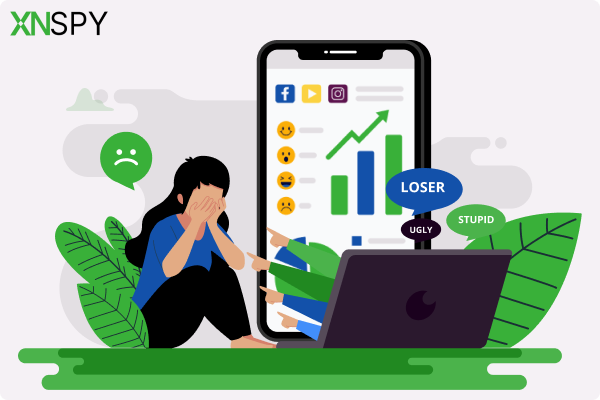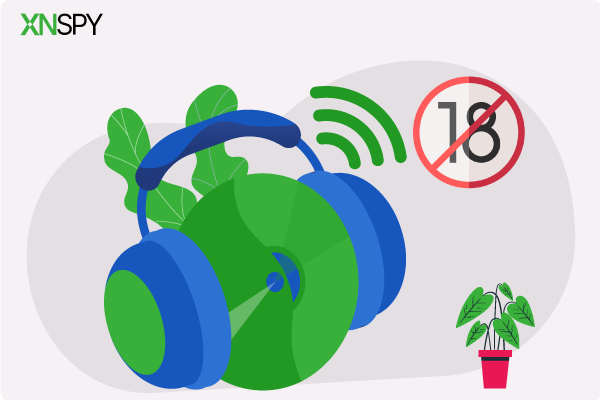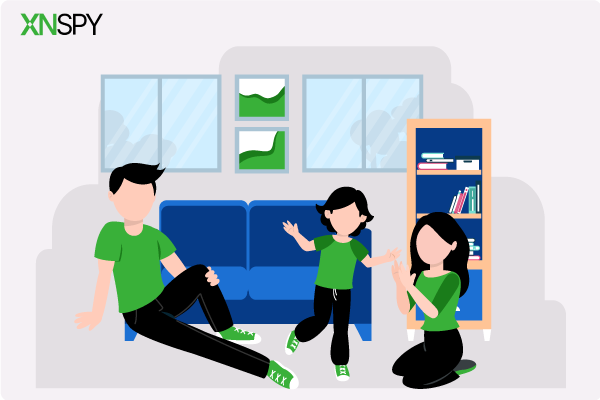The complete monitoring experience for your phone
Get XNSPY and start tracking calls, texts, multimedia, locations and more on any phone!
Get Started Now Live DemoChildren nowadays get exposure to the World Wide Web when they are in their diapers. It is both a bane and boon. Parents worry often about the various digital dangers and rightly so. One of the most underestimated Internet risks is the Dark Web.
Though most parents are informed regarding cyberbullying, inappropriate content and sexting, they are not well aware regarding the Dark Web. Dark Web is the part of the World Wide Web where illegal and various grotesque activities take place. It is a parent’s worst nightmare to know that their tween or teen has accessed the dark web.
Let’s break down the internet for a better understanding of the Dark Web.
Surface Web: World Wide Web is called the surface web. This part of the web is easily accessible via the different search engines like Google, Yahoo, and Bing. It accounts for 4-10% of the entire internet.
Deep Web: The Deep web has the content of other web services and databases. The pages are not indexed and are not visible to the regular search engines. One can find corporate intra-nets, academic databases, medical records, legal documents, scientific reports, and Government records here. The Deep web is accessible if you can pass through the password-protected area. Users have to search the individual databases to access information.
Dark Web: Dark Web: It is the encrypted part of the web where all kinds of illegal activities can take place. Some believe that the law enforcement agencies monitor the Dark Web. It is the market where buying and selling of everything take place.
Access to the Dark Web – What parents need to know:
The Onion Router (TOR) is the most common means to access the Dark Web. This acts as a safety guard for both the users and website operators. Numerous apps allow you to use TOR on your phone and other mobile devices. Sadly, it is extremely easy to find and download. All the more reason for parents to worry. (Valium)
Users can remain anonymous on the TOR because of the ‘virtual tunnels’ network owing to the encryption tools. One cannot find out a person’s physical location or the list of the websites they visit. These features of complete privacy and anonymity attract the teens toward it. At the same time, all types of hackers, online scammers, predators, criminals, and cyberbullies get a chance to hide their true identity. One cannot ever be sure who is sitting behind their screens and what dark, dangerous and illegal activity gratifies them.
TOR browser should not appear on your child’s computer or their mobile devices. After installation, it gives access to the TOR network which gives open access to some of the most disturbing web pages and sites among typical web pages. For instance, Hidden Wiki provides links to awful resources including hiring hitmen, drugs, false IDs, weapon trade, gambling, and child pornography. It keeps getting more sick and sinister.
The whole concept of an open marketplace of everything with no filter and filled with anonymous people is horrifying. The identities of users are hidden and the conversations are encrypted that make it a dream come true for those involved in everything illegal.
What can parents do?
No parent want to have their kids even hear of this horrible place. But let’s get real. If your kids have not explored the Dark Web, the odds are likely that they will surely give it some thought in near future. Just for fun. The idea of a place where no one can know who you are is rather exciting for them at this age. Their curiosity and need to rejecting the norms urge them to try out this dark place of the virtual world.
Therefore, it is essential that parents remain aware and well informed regarding their kids’ Internet activities. Here are some of the signs that indicate that your teen might be surfing the Dark Web.
- Notice your child’s behavior. See that if they have become secretive, withdrawn from their usual activities and prefer to spend more time in their room.
- Bad sleep, anxiousness, fatigue and being jumpy.
- See if they have suddenly made new friends you have not heard of before and you do not find them trustworthy.
- Your child is trying to cover their online activity and clears the internet history, changes passwords and installs new browsers.
- Your child is receiving postal packages from people you have never heard of before.
- You find cash at home being missing or from your bank account.
So what should parents do? Here are some pointers to help you if you have reason to believe that your teen has begun to access the Dark Web:
- Thoroughly check all the browsers on your kid’s laptop, PC, and mobile. If you find any unknowns or suspicious browsers, delete them from the OS.
- Go through their internet browsing history and look for unusually long URL. The TOR sites have lengthy web addresses. Run any unknown sites on Google.
- Xnspy is a reliable parental monitoring app that can greatly help you in keeping tabs on your kid’s internet activity. You could add certain words in the Watchlist and know if your kid is getting interested in the Dark Web. You can control damage before it gets out of hands.
The systems used for accessing the dark web are ever evolving. Best thing to do is talk to your kids. Expecting that your kids will never do such a thing or get attracted towards the Dark Web is not responsible parenting behavior. Have an open discussion with your teenager regarding the online dangers and explain that there is tons of illegal and inappropriate content on the web which you do not want them to access. Ask them what they already know about the Dark Web and do any of their friends use it.
Educating your teens regarding the online perils encourages them to practice safe and responsible online behavior.


